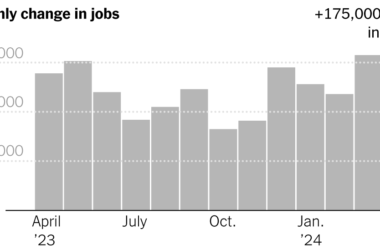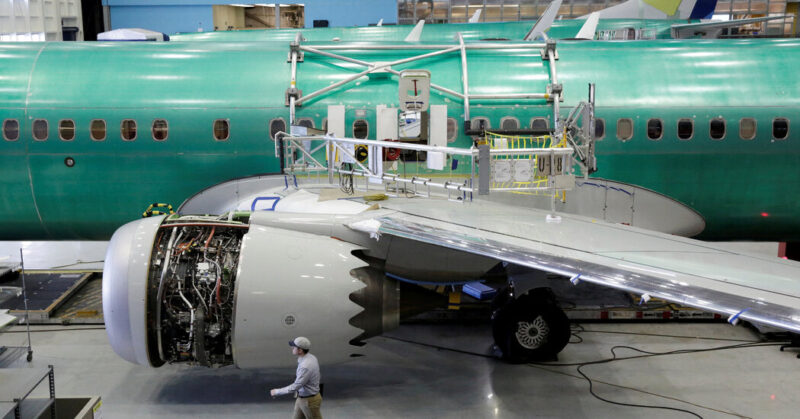Boeing on Wednesday reported a $355 million loss for the first three months of the year, as it deals with a quality crisis stemming from a Jan. 5 flight in which a panel blew off one of its planes.
The loss was not as steep as investor analysts had expected. Boeing brought in more than $16.5 billion in revenue in the first quarter, less than it reported the same period last year but also a bit more than analysts expected, and burned through almost $4 billion in cash.
The panel blowout on a 737 Max 9 jet during an Alaska Airlines flight resulted in no major injuries, but dealt a heavy blow to the company, reigniting concerns about Boeing’s practices five years after two fatal crashes involving 737 Max 8 planes. Since the Jan. 5 flight, the company has taken steps to improve quality, including expanding inspections, changing how work is performed, increasing training and soliciting more feedback from employees.
“We are absolutely committed to doing everything we can to make certain our regulators, customers, employees and the flying public are 100 percent confident in Boeing,” Dave Calhoun, Boeing’s chief executive, said in a letter to employees on Wednesday.
Last month, Mr. Calhoun said he would step down by the end of the year, part of a broader management shake-up. Boeing is also in talks to buy Spirit AeroSystems, a troubled supplier that builds the body of the Max jet and which had been a part of Boeing until it was spun out two decades ago.
The Federal Aviation Administration has increased scrutiny of Boeing, capping 737 production at 38 planes per month, though production remains well below that level. The regulator has demanded that Boeing produce a plan to improve quality by the end of May.
Boeing had been hoping to produce 50 737s and 10 larger 787s per month starting next year, but analysts say the company is unlikely to meet that goal. The recent crisis contributed to a substantial slowdown in deliveries in the first quarter, though the company reported a respectable 126 net new orders, thanks in large part to an American Airlines order for dozens of 737 Max 10 planes, a jet that the F.A.A. has yet to certify. Boeing said it has an order backlog of 5,600 planes, valued at $448 billion.
“Near term, yes, we are in a tough moment,” Mr. Calhoun said in the letter to employees. “Lower deliveries can be difficult for our customers and for our financials. But safety and quality must and will come above all else.”
Boeing’s commercial plane division reported an operating loss of more than $1.1 billion, offset by a $151 million operating profit at its defense division and a $916 million gain at its services division, which provides maintenance support to customers.
After the Jan. 5 flight, all Max 9 planes were briefly banned from flying, frustrating Alaska Airlines, United Airlines and other companies that rely on the plane. Both airlines said last week that they would have reported quarterly profits for the start of the year were it not for the plane’s grounding.
United said it will receive an undisclosed amount of compensation from Boeing for use on future plane purchases, while Alaska’s chief executive, Ben Minicucci, told reporters and analysts on a call last week that Boeing had paid his airline $162 million. Mr. Minicucci described that payment as a “strong reflection” of the airline’s close relationship to Boeing.
“Alaska needs Boeing, our industry needs Boeing, and our country needs Boeing,” he said.
Boeing faced two tense Senate hearings this month, one focused on criticism of the company’s safety culture and another airing the concerns of a whistle-blower who has raised questions about the durability of the 787 Dreamliner, a twin-aisle jet often used for long-distance flights. Boeing has vehemently denied his allegations, saying that the plane’s body has shown no signs of fatigue after extensive testing and years of commercial flights.
In February, an F.A.A. expert panel concluded a yearlong investigation, finding that Boeing’s safety culture remains flawed despite improvements made following the fatal crashes in 2018 and 2019. The panel also found that Boeing had made progress in limiting interference of employees who carry out delegated oversight on behalf of the F.A.A., but that opportunities to retaliate remain.
Boeing has said that it takes those findings seriously. The company has briefly paused work at more than a dozen sites to host quality discussions with more than 70,000 employees, Mr. Calhoun said in his letter to employees. Through those meetings, the company has received more than 30,000 recommendations for improvements. It has also encouraged workers to file concerns through its internal “Speak Up” portal, prompting a spike in submissions.
To address complaints that the company has focused excessively on financial results, Boeing this month said it would more closely align employees’ pay to quality measures. Operational performance will now account for about 60 percent of the score used to determine annual incentives in Boeing’s commercial planes division, up from 25 percent previously.







